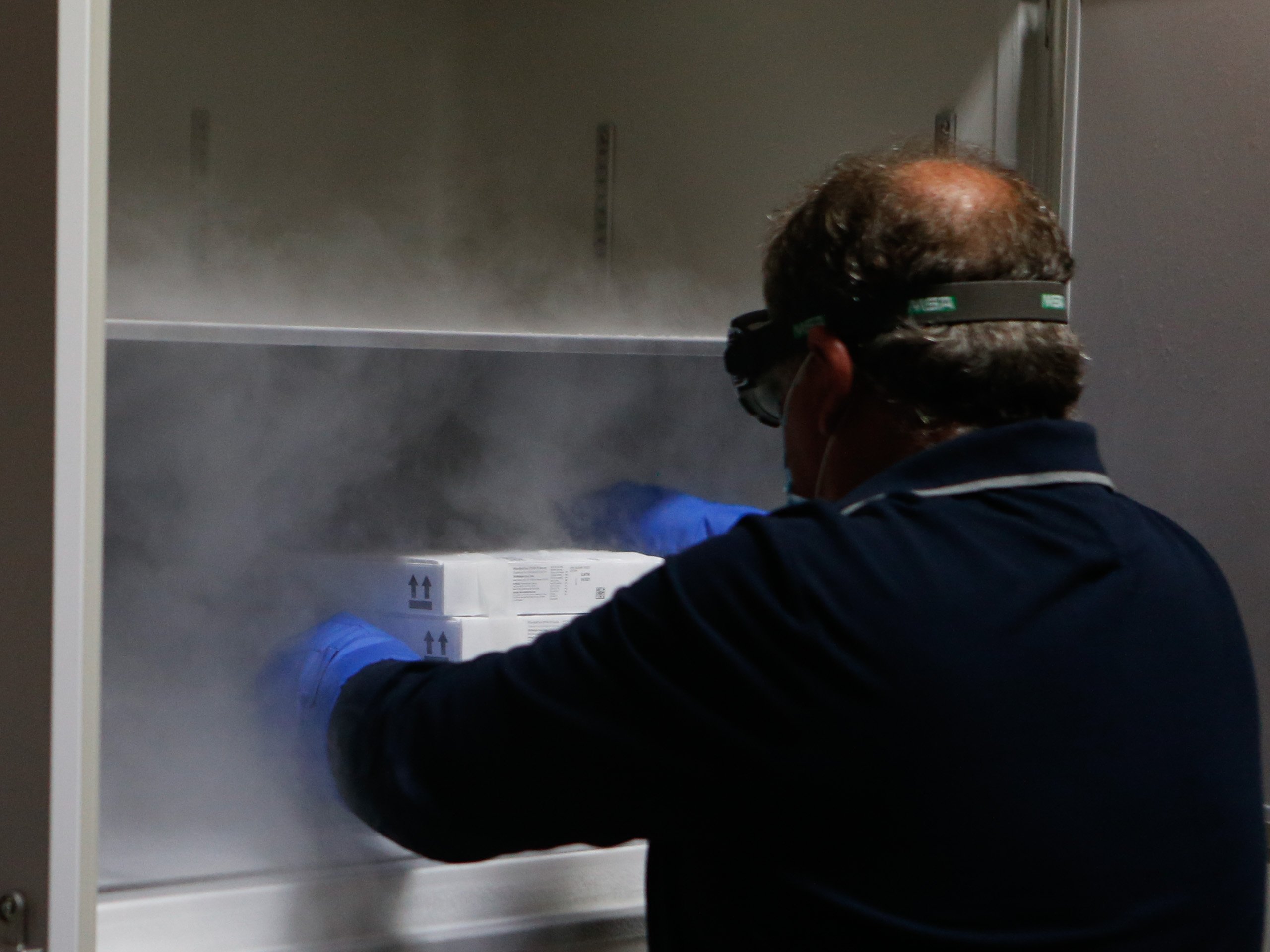The first batch of the Pfizer Covid-19 mRNA vaccine arrived in Cyprus on Saturday at the same time it was being delivered across the EU..
The vaccines are due to be rolled out in Cyprus on Sunday, first at a nursing home and then at the reference hospital in Famagusta.
The shipment was greeted by Health Minister Constantinos Ioannou and EU health commissioner Stella Kyriakides.
“Today is a milestone in the efforts of Europe and the rest of the world to deal with this huge health crisis,” said Ioannou. “The receipt of the vaccines today fills us with optimism and revives our morale that we are heading towards the end of this long road.”
The minister said the start of vaccinations on Sunday simultaneously in all EU Member States was the “beginning of the end, but not the end of the effort”.
“As you know, the flow of vaccines in the coming months will be small, but will gradually increase with the approval of other vaccines,” he said.
Ioannou said sufficient quantities had been ordered to vaccinate the entire population of Cyprus “if and when they wish”. He called it the “most effective tool we have at our disposal to deal with the pandemic, so once again we call on people to come and be vaccinated”.
He also praised the the EU’s efforts under Kyriakides for joint procurement of the vaccines, conveying the thanks on behalf of the government and all Cypriot citizens.
“In these difficult times, the fundamental values of the European Union, such as solidarity and cooperation, are becoming a reality for all EU citizens,” Ioannou said.
Kyriakides, in her statements said it was an emotional day. “This is European solidarity in practice and this is the time for Europe,” she said, adding that the delivery process would continue in the coming weeks and months “until we vaccinate a large part of the population so that we can gradually and carefully return to our daily lives. There is light on the horizon, there is hope and I wish everyone happy holidays and a good new year “.
Kyriakos Mikellis, the head of Pfizer for Cyprus and Malta described the day as “significant” and “a milestone in the fight against pandemic” and a way to create a gradual return to normalcy.
According to CNA, a post on the Twitter account of the Cypriot Airports said: “Today we hope that a different day has dawned. The first vaccines have arrived at Larnaca airport and this means that the end of the pandemic begins tomorrow! Happy holidays!”.

Cyprus has ordered vaccines from four different countries as part of an EU-wide move.
The island expected to receive 600,000 from AstraZeneca, 200,000 from Johnson&Johnson and 200,000 from Pfizer/BioNTech, which is a new kind of vaccine that instructs the body to produce the coronavirus spike itself through mRNA technology.
The first doctor to get the shot on Sunday will be Dr Christos Kypri at the Famagusta reference hospital. He called the vaccines “a medical miracle” and something that brings hope, and he is honoured to be among the first doctors who will be vaccinated in Cyprus.
He said that the vaccinations at the hospital would take place at around 11am at the A&E and that 15-20 doctors and nurses would get the jab.
The ministry has already issued guidelines for the public and presented the inoculation card to be given to people to remind them to go for the second dose.
Priority will be given to vulnerable groups, starting with staff and residents of nursing homes and care homes for people with chronic diseases, and healthcare professionals. Vaccination of the wider population is expected to start in the summer.
Other than the government programmes, vaccinations will take place only by appointments made through an online portal. No self-isolation will be necessary between the first and second doses.
According to the ministry, the vaccine reduces the risk of being infected but some people may still become infected with Covid, despite the jab. If so, the vaccine may reduce the symptoms associated with coronavirus as long as people make sure to have their two doses, the ministry said.
“Like all medicines, no vaccine is completely effective… that’s why even after the vaccination the person must apply the usual practices of personal hygiene and protection, such as frequent hand washing, maintaining social distance and using a face mask,” the ministry said.
The ministry said the vaccine cannot cause coronavirus to develop in a person.
“Like all medicines, vaccines can cause side effects, although not everybody gets them,” said the ministry.
“Most of them are mild and do not last long and certainly do not happen to everyone.”
It stressed, however, that even if someone presents with symptoms after the first dose, they should take the second dose for better protection. Serious adverse effects must be reported through the national adverse reaction system to the pharmaceutical services by submitting the ‘yellow card’ in the following ways:
Online submission: http://www.kitrinikarta.gov.cy
Printed copy of the Yellow Card available from the website of the Pharmaceutical Services:
https://www.moh.gov.cy/phs
• By mail (toll free): Pharmacovigilance Unit, Pharmaceutical Services, Ministry of Health CY-1475, Nicosia, telephone 22608607
• Submission by fax to +357 22608669


